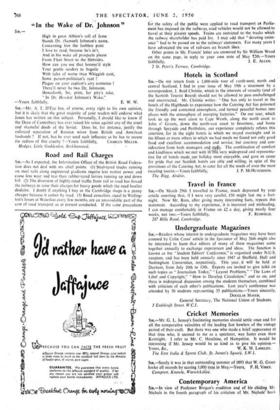Road and Rail Charges
SIR,—As I expected, the Information Officer of the British Road Federa- tion does not deal with my chief points. (1) Steel-tyred trucks running on steel rails along engineered gradients require less motive power and cause less wear and tear than rubber-tyred lorries running up and down hill. (2) The diversion of highly-rated traffic from rail to road has forced the railways to raise their charges for heavy goods which the road haulier disdains. 1 doubt if anything I buy in the Cambridge shops is a penny cheaper because it comes by road. (3) Road casualties, equal to Welling- ton's losses at Waterloo every few months, are an unavoidable part of the cost of road transport as at present conducted. If the same precautions for the safety of the public were applied -to road transport as Parlia- ment has imposed on the railways, road vehicles would not be allowed to travel at their present speeds. Trains are restricted to the tracks which the railway shareholder has paid for. I mad add that ** derating 'assist- ance " had to be passed on to the railways' customers. For many years I have advocated the use of rail-cars on branch Wnes.
Other points in Mr. Francis' letter are answered by Sir William Wood on the same page, in reply to your own note of May 12th.—Yours 2 St. Peter's Terrace, Cambridge.


































 Previous page
Previous page